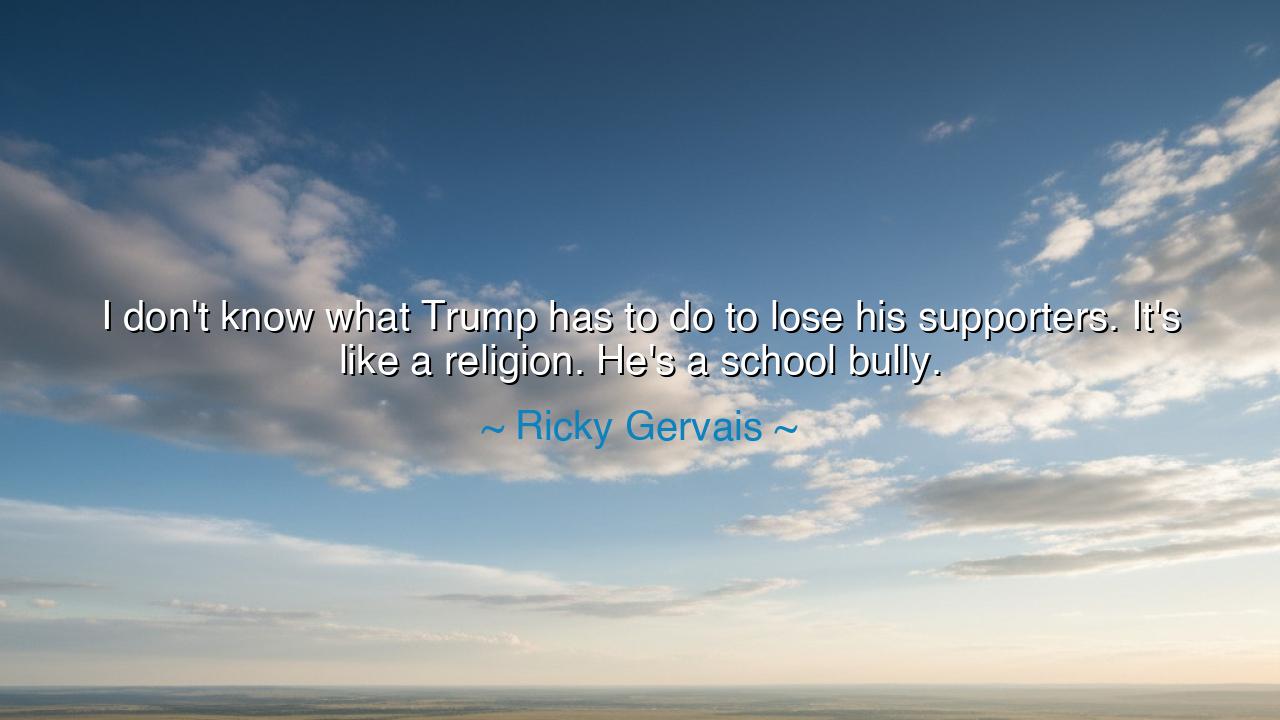
I don't know what Trump has to do to lose his supporters. It's
I don't know what Trump has to do to lose his supporters. It's like a religion. He's a school bully.






"I don't know what Trump has to do to lose his supporters. It's like a religion. He's a school bully." These words from Ricky Gervais offer a sharp critique of the nature of blind loyalty and idolization that can develop around political figures. Gervais draws a powerful comparison between the unwavering support of Donald Trump and the zealous faith often found in religion, suggesting that some supporters follow him not based on reason or logic, but on an emotional attachment that borders on devotion. He likens it to the behavior of a school bully — someone who may act aggressively and without consideration for others, yet still garners loyalty from those who follow him uncritically, perhaps out of fear, admiration, or a misguided sense of loyalty.
The origin of Gervais’s critique can be traced to ancient discussions of power, loyalty, and blind faith. Plato warned about the dangers of leaders who use charisma and manipulation to control the masses. In his Republic, Plato describes the tyrant as someone who gains power by appealing to the baser instincts of the people — their fear, their prejudices, and their desire for simple answers to complex problems. The tyrant, like a bully, may exploit these emotions to maintain control, while those who support him do so not because they see him as just or wise, but because they are drawn into a dynamic of submissive loyalty or fear of retribution. This, in essence, is what Gervais sees in the political loyalty of some Trump supporters: a blind allegiance, grounded not in reason but in emotion.
Consider the historical example of Adolf Hitler and his rise to power in Nazi Germany. Hitler, like many demagogues, used charisma and fear to manipulate the masses. He offered simple solutions to complex problems and preyed on the insecurities and fears of a society in turmoil. His supporters followed him not because of rational thought, but because they felt an emotional pull toward him, much like the loyalty one might have to a religion or a bully. The irrationality of his followers and their ability to turn a blind eye to the atrocities he committed highlights the dangers of unquestioning loyalty. Hitler's supporters, much like some of Trump’s, saw their leader as a symbol of power and identity, even when his actions were harmful to others and society at large.
In ancient Rome, Julius Caesar used a similar approach to gain and maintain power. His popularity was built not on his moral authority or ability to govern wisely, but on his appeal to the masses, offering them bread and circuses to distract from the corruption of the system. The people of Rome, much like Trump’s supporters, were drawn to Caesar because he represented a way to break free from the established order, a charismatic figure who could deliver them from their struggles. Caesar's supporters were often blinded by their loyalty to him, failing to see the dangers of his increasing dictatorship. Similarly, Gervais’s comparison to religion highlights how people can become so emotionally attached to a leader that they fail to critically evaluate his actions or the harm he might be causing.
The lesson from Gervais's words and these historical examples is a call for critical thinking and self-awareness in the face of power and charisma. Loyalty to a leader should not come at the cost of reason or morality. The danger of blind allegiance is that it clouds our judgment and makes us susceptible to manipulation, much like those who follow a bully without understanding the harm he does. It is essential that we question those in power, not just because of their rhetoric, but because of the consequences of their actions. Just as Plato warned against the seductive nature of tyranny, we must recognize that blind devotion can lead to the destruction of our own values and the well-being of society.
To apply this wisdom in our own lives, we must learn to cultivate critical discernment and challenge unchecked loyalty. Whether in our political leaders, our communities, or even in our personal relationships, we must avoid following others without fully understanding the implications of their actions. True loyalty is not about unquestioning faith but about aligning ourselves with principles that uphold justice, integrity, and compassion. Let us resist the temptation to follow blindly and instead seek to understand the truth behind the actions of those we support. In doing so, we protect ourselves from becoming pawns in a system built on manipulation and fear.
Ultimately, the wisdom in Gervais’s words reminds us that true leadership is built on trust, reason, and a commitment to the greater good, not on manipulating emotions or cultivating blind followers. It is our responsibility to question and to hold leaders accountable, ensuring that they lead with integrity and respect for others, not by fostering division or promoting harmful loyalties. Only through critical engagement with the world around us can we avoid the dangers of being drawn into the power dynamics of a bully, whether on the playground, in politics, or in society at large.






AAdministratorAdministrator
Welcome, honored guests. Please leave a comment, we will respond soon